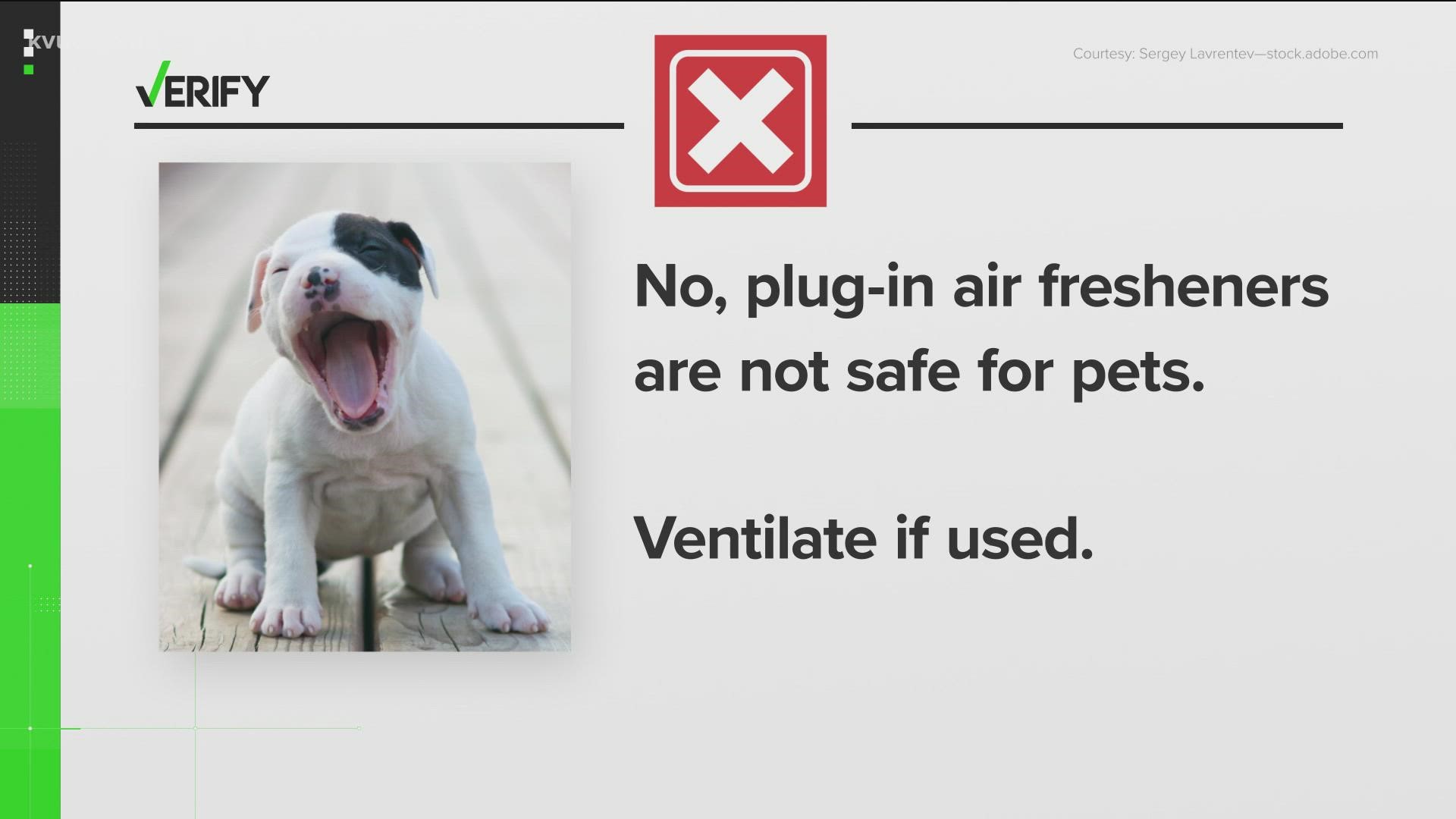AUSTIN, Texas — Many of us consider our pets as part of our families. A viewer asked the KVUE VERIFY team about protecting pets around plug-in air fresheners.
The question
Are plug-in air fresheners safe for pets?
The sources
- Veterinarian Dr. E. Murl Bailey Jr., D.V.M, Ph.D., Professor at Texas A&M and Diplomate of the American Board of Veterinary Toxicology
- Pawel Misztal, Ph.D., Professor with the Department of Civil, Architectural and Environmental Engineering at The University of Texas at Austin, Misztal Sniffer Lab
- Tufts University
- Northern Arizona University
- The American Society for the Prevention of Cruelty to Animals
The answer
No, plug-in air fresheners are not safe for pets.
If you use them, make sure to ventilate the area.
What we found
We want our home to smell clean and keep our pets safe.
“A dog’s nose is so sensitive. It can see one molecule per trillion. It’s basically putting a little drop in six Olympic swimming pools,” Pawel Misztal, Ph.D., Professor with the Department of Civil, Architectural and Environmental Engineering at the University of Texas at Austin and Misztal Sniffer Lab said.
“There will be microdroplets that can get on the skin,” Veterinarian Dr. E. Murl Bailey, Jr., D.V.M, Ph.D., Professor at Texas A&M and Diplomate of the American Board of Veterinary Toxicology said.
Bailey said the same warnings about plug-in air fresheners are also for essential oils.
“There’s a significant association between the pet’s weight, age and species —especially cats — with the severity of illness. The smaller and younger a pet is, the sicker they are likely to get. The same goes for pets with liver disease,” Tufts University research on essential oils shows.
“All of these air fresheners will contain some kind of scent. They also contain volatile organic chemicals, which allow them to diffuse in the air,” Bailey said.
Northern Arizona research shows some volatile organic compounds can cause cancer in animals.
Misztal said more research is being done around indoor air quality.
Researchers, he said, have found many air fresheners contain cyclic volatile methyl siloxanes (cVMS).
“Interestingly, they are not regarded as acutely toxic and which is why they’re permitted. They are often added to many different types of consumer products. The reason why I am concerned is because it is odorless. So we cannot detect exposure to those compounds without scientific equipment, and they seem to bioaccumulate. They bioaccumulate in the environment so why would they not bioaccumulate in humans, our dog,” Misztal said.
Mistzal said ventilation is the only way to practice safety around any air freshener.
“If you use air fresheners at least you really need to ventilate the space to remove excess of those compounds,” Misztal said.
Bailey said cats are more susceptible to volatile organic compounds (VOCs) because of how cats groom themselves.
“Cats are very fastidious, and they will lick it off of their hair coat. Dogs are not quite so fastidious, so they don't do a lot of licking and cleaning like cats do,” Bailey said.
ASPCA suggests to not keep a diffuser in the same room (or use a strong concentration) with animals who groom themselves.
If you see something online and want to know if it’s true email us, verify@kvue.com.
PEOPLE ARE ALSO READING:

